
What is JEE Advanced Exam? (a quick overview)
JEE Advanced is a highly competitive examination for admission to undergraduate engineering programs at the Indian Institutes of Technology (IITs).
The exam is conducted annually by one of the seven zonal IITs (IIT Roorkee, IIT Kharagpur, IIT Delhi, IIT Kanpur, IIT Bombay, IIT Guwahati, IIT Madras) on a rotational basis.
- The exam consists of two papers: Paper 1 and Paper 2, both of which are conducted on the same day.
- The papers consist of multiple-choice questions and numerical answer type questions from Physics, Chemistry, and Mathematics.
- The examination is usually held in the month of May and the results are usually declared in the month of June.
Candidates who are successful in JEE Advanced are eligible for admission to undergraduate programs at the IITs and other leading engineering institutes in India which opens doors to many opportunities for the individual and achieve success in life. There are tonnes of reasons why one should take the JEE Advanced Examination
JEE Advanced 2026 Important Highlights
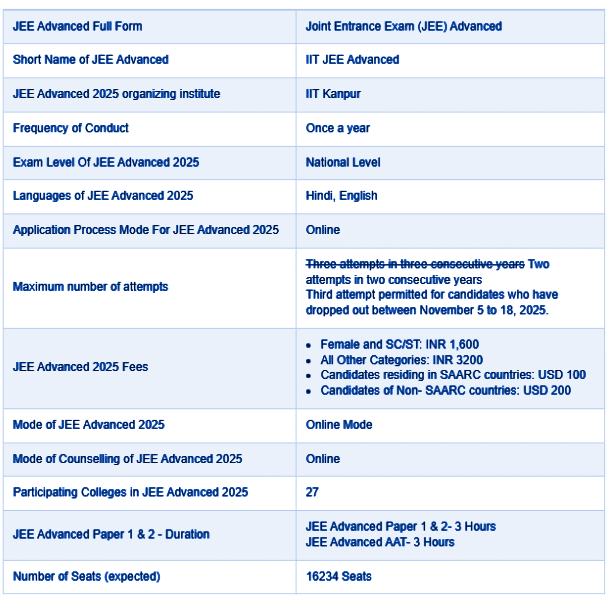
JEE Advanced 2026 Exam Date
- The JEE Advanced 2025 exam is scheduled to be held on May 18, 2025 and will be organised by IIT Kanpur.
- The exam is conducted in an online format, with two papers that must be completed in two shifts on the same day. Both papers are mandatory.
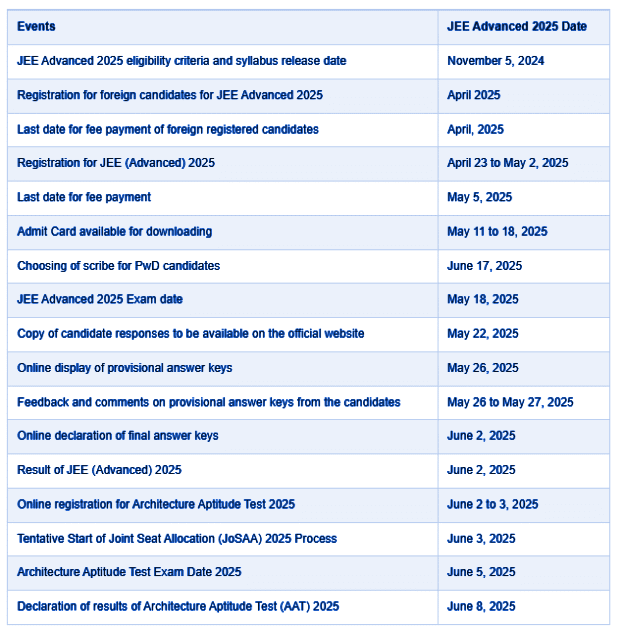
JEE Advanced 2026 Eligibility
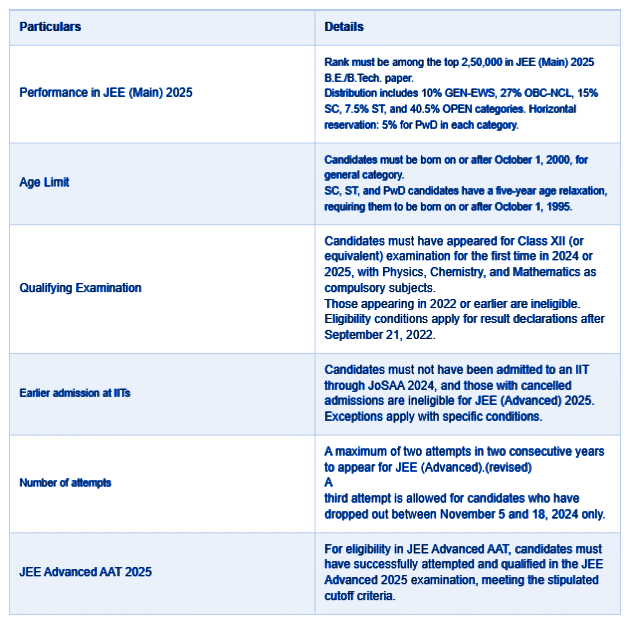
Check the detailed Eligibility criteria on this EduRev link:
JEE Advanced 2026 Application
The application process for JEE Advanced typically includes the following steps:
- Register for JEE Advanced by providing personal and academic details (JEE Main 2025 registration number and password), and choosing the examination centers.
- Upload scanned copies of required documents, such as photograph and signature.
JEE(Main) qualified candidates are required to upload the following scanned certificates: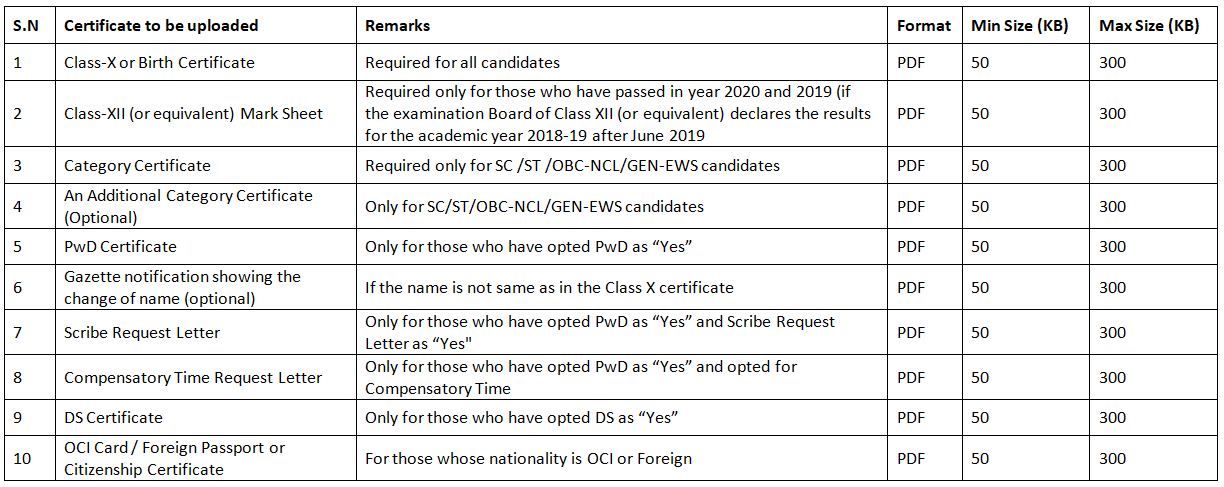
Note: The size of each image should be less than 300KB and the image dimension should be 3.5cm x 4.5cm for photograph and signature.
- Pay the application fee, which can be done online using a credit card, debit card, or net banking. The application fee for the JEE Advanced exam is non-refundable and is used to cover the costs associated with administering the exam.

- Print the confirmation page for future reference.
It is important to note that the application process for JEE Advanced is usually open for a limited time period, and candidates are advised to submit their applications well before the deadline to avoid any last-minute issues.
JEE Advanced 2026 Exam Pattern and Marking-Scheme
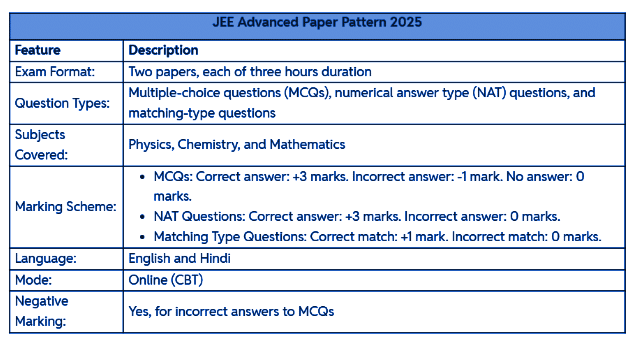
Marking Scheme for JEE Advanced 2026 Paper 1
As per the official notification, the marking scheme for Paper 1 of JEE Advanced 2025 is as below:
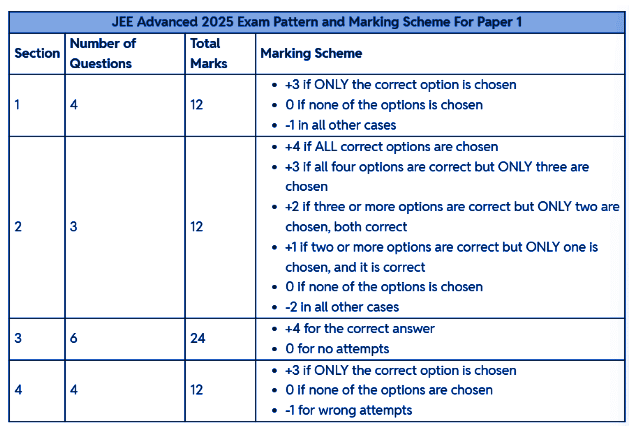
Paper 2
Marking Scheme for JEE Advanced 2026 Paper 2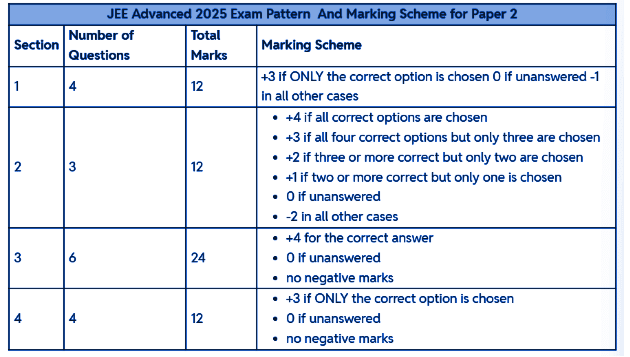
JEE Advanced 2026 Syllabus
JEE Advanced syllabus includes topics from Physics, Chemistry and Mathematics.- Physics topics: Mechanics, Thermodynamics, Electromagnetism, Optics and Modern Physics
- Chemistry topics: Physical Chemistry, Inorganic Chemistry and Organic Chemistry
- Mathematics topics: Algebra, Trigonometry, Analytical Geometry, Differential Calculus, Integral Calculus and Vectors
JEE Advanced also tests candidates on aptitude, reasoning and comprehension skills.
The syllabus details in the table below will help aspirants get an overview of topics for all subjects of this exam: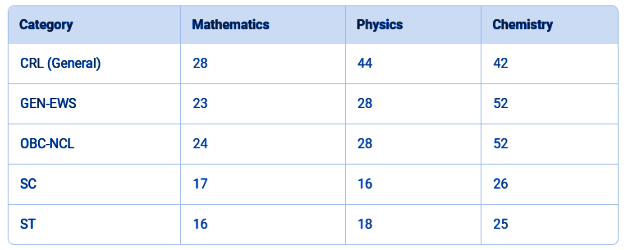 You must keep the full syllabus in mind and prepare from basics. You should also practise mock tests based on the syllabus and attempt the previous year’s question papers.
You must keep the full syllabus in mind and prepare from basics. You should also practise mock tests based on the syllabus and attempt the previous year’s question papers.
JEE Advanced 2026 Preparation Tips
Step 1: Understand the syllabus and exam pattern
Step 2: Understand the Previous Year Questions(PYQs) If you are starting early, cover difficult and scoring topics first and then study the easier topics. If you are on a deadline, cover the easier and scoring topics first.
Step 3: Select the right course and reference books Find a course that provides an explanation of the topics along with daily practice problems. A course that has revision notes, formula sheets, mind-maps for class 11 and mind-maps for class 12, previous year questions, mock tests and solutions to reference books is all you need.
Step 4: Make a Plan Directly jumping into the preparation without a plan will cost you double the effort. Therefore, it is important to have a plan and a set timetable to optimise your preparation.
- Make a timetable so that you have sufficient time to learn all the concepts and practice them.
- Divide time in such a way that you are able to cover all the subjects.
- Always set aside a few hours for revision.
Step 5: Prepare for Mathematics, Physics and Chemistry productively
- Mathematics: Start by understanding the basic concepts and formulas before moving on to solving problems. Practice solving problems of different types and difficulty levels. Use visual aids such as graphs and diagrams to understand mathematical concepts better.
- Physics: Understand the concepts and theories by reading the textbook, and then practice solving problems based on these concepts. Pay attention to the units and dimensions of the physical quantities and their relations. Use diagrams and illustrations to understand the concepts better.
- Chemistry: Learn the basic concepts and principles of chemistry. Practice solving problems based on these concepts. Pay attention to the chemical reactions and the chemical equations. Use flashcards to memorize the chemical formulas and reactions.
- Make use of JEE Advanced mock tests and previous years question papers to get a better understanding of the exam pattern and the type of questions that are asked in the exam.
- Use online resources such as video lectures, interactive quizzes, and practice problems to supplement your preparation.
JEE Advanced Exam has three subjects: Physics, Chemistry and Mathematics. The strategy required to prepare for these subjects vary from one another and it can be confusing at times how to start preparing for them. EduRev has provided all the necessary tips required to ace these subjects. Take a look at this EduRev article which is a step by step approach to prepare for JEE Advanced.
JEE Advanced 2026 Preparation Material
The right preparation material is crucial for success in the JEE Advanced, as it is a highly competitive examination that requires a thorough understanding of the subject matter and a strong problem-solving ability. Preparing with the right materials can help students develop a strong foundation in the key concepts and problem-solving strategies needed to excel on the JEE Advanced.
Some of the key features to look for in JEE Advanced preparation material include:
- Up-to-date and accurate information that aligns with the latest exam pattern and syllabus.
- Comprehensive coverage of all the subjects, including Physics, Chemistry, and Mathematics.
- Practice problems and question sets that closely resemble the difficulty level and format of the actual JEE Advanced exam.
- Detailed solutions and explanations for all the practice problems, to help students understand the reasoning behind the correct answers.
- Previous year question papers, to provide students with an idea of the types of questions that have been asked in the past and how to approach them.
Using the right preparation material can help students build their confidence, develop strong problem-solving skills, and increase their chances of success on the JEE Advanced.
How to prepare for JEE with EduRev Infinity
EduRev Infinity Package for JEE includes
- Subject-wise Courses: Courses for all the 3 subjects: Physics, Chemistry, and Mathematics. Each course offers topic-wise video lectures, detailed notes & online tests for each topic.
- Guidance book and Revision Notes: With the EduRev Infinity access, you can have access to the NCERT Exemplar and JEE Revision Notes so that you can save time and effort in finding the best learning resources.
- Solutions for Reference Books: EduRev’s Infinity package for JEE also includes solutions for reference books like HC Verma, DC Pandey, and Irodov.
- Discussion forum: Along with the learning, you can get your doubts solved with the help of the discussion forum; the largest community of teachers and students to help you all the time.
- Previous Year Question Papers: You will get solved previous year question papers for Physics, Chemistry, and Mathematics, as well as topic-wise solved PYQs for JEE Mains and Advance which have appeared in the last 35 years.
- Daily Practice Problems (DPPs): To get a better understanding of different types of questions, you can refer to the Daily Practice Problems for JEE Mains and Advanced available in EduRev’s Infinity package.
- Mock Test Series for JEE preparation: EduRev provides Mock Test Series for JEE Mains and Advanced, which includes over 160 mock tests including part-test which helps you prepare particular topics better.
- Test Analysis: You will get a comprehensive analysis of the tests you attempted, with in-depth solutions to each question. You will also gain insight into your performance relative to other test-takers, with an All India Rank, to identify your strengths and weaknesses.

- Revision Material: EduRev offers comprehensive revision notes, formula sheets, mind maps, and PPTs for quick and easy last-minute revisions.
- Crash course: If you have limited time, EduRev also provides a crash course for JEE preparation with detailed and structured video lectures.
JEE Advanced 2026 Best Books for Preparation
Good books are an essential part of JEE Advanced preparation as they provide students with the necessary knowledge and understanding of the concepts covered in the exam. It is important that the book has clear explanations, worked-out examples, and plenty of practice problems to help you solidify your understanding.
Here are some recommended books for JEE Advanced 2025 preparation:
- Physics:
- "Problems in General Physics" by I.E. Irodov
- "Problems in Mathematics" by A. A. Kirillov
- "Problems in Physics" by S.S. Krotov
- "Concepts of Physics" by H.C. Verma (Volumes 1 and 2)
- "Objective Physics" by P. Bahadur
- Mathematics:
- "Mathematics for JEE (Advanced)" by Tata McGraw Hill
- "Problems Plus in IIT Mathematics" by A. Das Gupta
- Chemistry:
- "Organic Chemistry" by Morrison & Boyd
- "Numerical Chemistry" by P. Bahadur
- "Inorganic Chemistry" by J.D. Lee
Mock Tests for JEE Advanced 2026
- Mock tests are important for preparing for the JEE Advanced because they provide you with a simulation of the actual test-taking experience. By taking mock tests, you can experience the pressure and time constraints of the actual test, which can better prepare you for the real thing.
- Mock tests can also help you to identify areas where you may need to improve your time management skills and to develop strategies for pacing yourself during the test. They also allow you to identify your weaknesses, so that you can work on them before the actual exam.
- This would allow you to have a clear idea of your performance, and take necessary steps to improve your score.
- Additionally, mock tests are an opportunity for you to familiarize with the types of questions that will be on the actual test. Taking mock tests can help to reduce test anxiety.
EduRev provides mock tests for JEE Advanced 2025 based on previous year papers. It is designed to help students practice and prepare for the JEE Advanced exam. The course contains full-length mock tests with solutions, and it also provides detailed analysis of performance to help students identify their strengths and weaknesses. The course also provides tips and strategies to improve your' performance in the JEE Advanced 2025 exam.
JEE Advanced 2026 Exam Centres
- The JEE Advanced 2025 Exam Centre list, as well as the information brochure is released by IIT Kanpur.
- Candidates will have to select 6 exam centers from the provided list based on their zone while filling out the JEE Advanced 2025 Application Form.
- The exam will not be held in any country other than India, but international candidates can take the exam at Indian centers at their own expense.
Check out this EduRev article for complete coverage on the exam centres for JEE Advanced 2025 and know your nearest exam centre.
Admit Card
- Candidates who register and pay the application fee for JEE Advanced 2025 will receive their admit card, which includes the assigned test center location
- On the day of the exam, candidates must bring:
- a printed copy of the admit card
- a valid original photo ID, such as Aadhaar Card, School/College/Institute ID, Driving License, Voter ID, Passport, PAN Card, or a Notarized Certificate with a photograph
- Only candidates with valid admit cards and photo IDs will be allowed to enter the examination hall.
- Candidates are only allowed to bring a pen, pencil, drinking water in a transparent bottle, a downloaded admit card and a photo ID inside the examination hall.
JEE Advanced 2026 Answer Key
IITK will publish the answer key for JEE Advanced 2025 on its official website. Initially, a provisional answer key will be made available for candidates to raise objections, if required. After the objections are addressed, the final JEE Advanced 2025 answer key will be released in conjunction with the exam results.
JEE Advanced 2026 Result
The result of JEE Advanced 2025 conducted by IIT Kanpur will be made public on their official website and will include the subject-wise marks, total marks obtained, the candidate's All India Rank, and category ranking. Successful candidates of JEE Advanced 2025 will receive a notification on their registered mobile number. No physical scorecard or result will be sent via post or any other offline means. You can expect the result to be out by end of June 2025.
To check your JEE Advanced 2025 result you would have to go by the following steps:
- Visit the official JEE Advanced website (jeeadv.ac.in)
- Click on the "JEE Advanced 2025 Result" link.
- Enter your JEE Advanced 2025 registration number and other required details.
- Check and download your JEE Advanced 2025 result and take a printout for future reference.
JEE Advanced 2026 Cut-Off (Expected)
The expected cutoff for JEE Advanced 2025 is the minimum score a candidate needs to secure in order to be eligible for admission to the Indian Institutes of Technology (IITs).
The cutoff is determined by various factors such as the number of candidates appearing for the exam, the difficulty level of the exam, and the total number of seats available.
The exact cutoff for JEE Advanced varies every year. However, based on previous years' cutoffs, the expected cutoff for JEE Advanced is generally around the top 20-30 percentile of all candidates. It means that only the top 20-30% of candidates who take the exam will be eligible for admission to the IITs.
The actual cutoff would be announced by the official conducting body after the exam.
Based on the past year cutoffs marks, we have predicted the cutoffs to be around the values as described in the table below.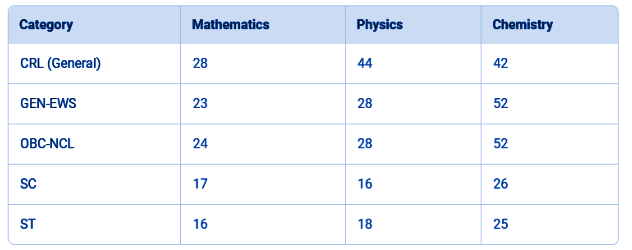
Frequently Asked Questions(FAQs) related to JEE Advanced
What is the format of the JEE Advanced exam?
JEE Advanced is a computer-based test and consists of two papers, Paper 1 and Paper 2, which are held on the same day. Both papers are mandatory and have to be attempted in a single session.
How many times can a student attempt JEE Advanced?
A student can attempt JEE Advanced a maximum of two times in consecutive years.
What is the eligibility criteria for JEE Advanced?
To be eligible for JEE Advanced, a student must have appeared for the JEE Main exam and should be among the top 2,50,000 rank holders. Additionally, the student should have passed class 12th or equivalent exam in the previous year or should be appearing for the same in the current year.
How is the JEE Advanced paper structured?
JEE Advanced paper is divided into three sections - Physics, Chemistry, and Mathematics. Each section has 20 multiple choice questions and 5 numerical answer type questions.
What is the minimum percentage required in class 12th to be eligible for JEE Advanced?
There is no minimum percentage requirement in class 12th to be eligible for JEE Advanced, however, the student should have passed class 12th or equivalent exam in the previous year or should be appearing for the same in the current year.
How many questions are asked in JEE Advanced and what is the marking scheme?
JEE Advanced consist of two papers, Paper 1 and Paper 2, each having 54 questions. Each paper is for a total of 180 marks. Each correct answer carries 3 marks, and for each incorrect answer, 1 mark is deducted.
What is the cutoff for JEE Advanced?
JEE Advanced cut-off is the minimum marks required to qualify for the next round of the admission process. The cutoff varies each year depending on the number of applicants, the difficulty level of the exam, and the total number of seats available.
How important is the JEE Advanced rank in getting into IITs?
JEE Advanced rank holds significant importance in getting into IITs. Based on the rank, students are allotted seats in the IITs during the counselling process.
What are the best resources and study materials for JEE Advanced?
NCERT books, previous years question papers, coaching institute study materials and mock tests are considered to be the best resources for preparing for JEE Advanced.
How can one prepare for JEE Advanced while balancing class 12th board exams?
Preparing for JEE Advanced while balancing class 12th board exams can be challenging. It is recommended to make a schedule and stick to it, focus on the key areas and practice as much as possible, and keep a balance between board exams and JEE Advanced preparation.
Will JEE Advanced 2025 be easy?
No. JEE Advanced is considered as one of the most difficult engineering examinations in the world. Lakhs of students prepare for this entrance exam, which increases its difficulty level. The reason is that JEE Advanced needs to identify the top 5 percent of the set shortlisted through JEE Main, which is the top 1 percent of the candidates writing JEE Main, i.e. out of 1M+ students who take JEE exam, only 20k can actually clear it.
Are 7 months enough for JEE Advanced?
Although most students usually take one or two years to prepare for JEE Main and Advanced, you can also ace these exams with a tight study routine of 6 months. All it requires is hard work and dedication.
Do questions in JEE Advanced repeat?
Jee questions doesn't repeat. However, it is advised to check out PYQs thoroughly as the basic concept and exam pattern usually remains the same.
FAQs on JEE Advanced 2026: Eligibility, Registration, Exam date, Admit Card, Exam Pattern, Syllabus
| 1. What is the JEE Advanced exam and who conducts it? |  |
| 2. What are the eligibility criteria for JEE Advanced? |  |
| 3. What is the syllabus for the JEE Advanced exam? |  |
| 4. What are some effective preparation tips for JEE Advanced? |  |
| 5. How can EduRev Infinity assist in JEE Advanced preparation? |  |















